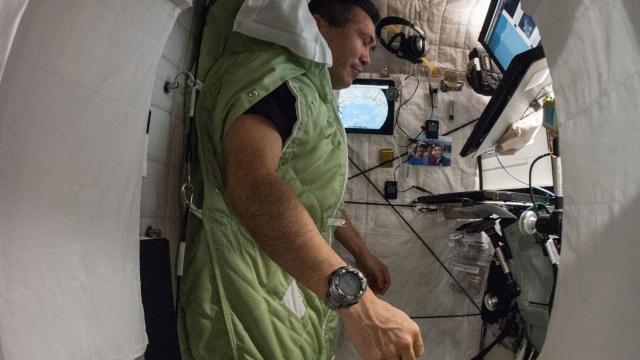If you thought you had trouble sleeping in your own bed, try sleeping in a microgravity environment, strapped to a sleeping bag while orbiting the Earth at 28,164 km per hour. Astronauts have difficulty maintaining a normal sleep pattern under an artificial day and night cycle, resulting in poor sleeping habits.
In order to monitor astronauts’ sleeping patterns, a group of scientists from Aarhus University in Denmark designed a small device to measure how astronauts experience sleep in space. The device is called ear-EEG (ear-ElectroEncephaloGraphy), and it can be worn on the ear similar to earphones. Once in place, the ear-EEG will monitor the astronauts’ electrical activity in the brain while they sleep. It works by detecting extremely small voltage changes on the surface of the skin inside the ear, which are caused by electrical activity coming from the brain’s neurons, according to Aarhus University.
“In the future, we’ll probably be in space a lot more often, and have to stay there for longer. And it’s important to understand how it affects our sleep,” Eskild Holm Nielsen, dean of the Aarhus University Faculty of Technical Sciences, said in a statement. “Being able to make a precise physiological characterization of the sleep will also help us find out how we can help astronauts get a better night’s sleep in space.”
Astronauts are often tucked in small quarters about the size of phone booths, where they are stuffed inside a sleeping bag that’s tethered to a wall. They also function under a false day and night schedule that’s enforced by changing the light settings on the space station from light to dark to ensure that they get about 6-8 hours of sleep every day. Aside from that, they lack the everyday comforts of resting their head on a pillow since, well, there’s no gravity to hold their head down, as well as the feeling of a blanket covering them.
The ear-EEG will be used by astronauts on board the International Space Station, as well as down here on Earth in order to measure the difference in their sleeping patterns between Earth and space. The data will help the scientists observe how much being in space affects astronauts’ sleep on a physiological level, which could affect their cognitive functions like decision-making skills, memory, judgment and attention span. The scientists are also curious to measure how different environments affect a person’s sleep patterns.
